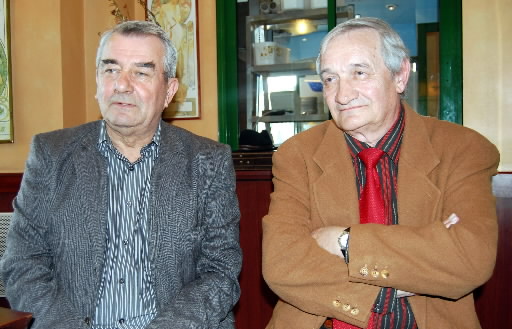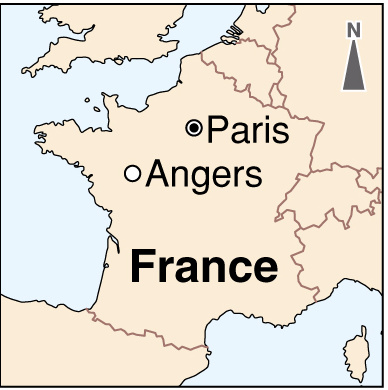Nuclear weapons can be eliminated: Chapter 5, Part 5
Jul. 21, 2009
Chapter 5: Unseen targets in the U.K. and France
Part 5: Victims of nuclear tests
by Yumi Kanazaki, Staff Writer
France confronts its "negative legacy"
Since 1960 France has conducted 210 nuclear tests in Africa’s Sahara Desert and French Polynesia. A total of 150,000 soldiers and others were engaged in carrying out these tests, which were conducted both in the atmosphere and underground. Local residents also suffered harm as a result.
In the city of Angers, southwest of Paris, Michel Verger, 70, president of the Association for Nuclear Test Veterans (AVEN), greeted me with a friendly smile.
Mr. Verger discussed his thoughts on a bill relating to compensation for the health consequences of nuclear testing, which received cabinet approval in May. “The government, which has said that our nuclear experiments were ‘clean,’ has finally taken action. That’s for sure, but the content of the bill is a long way from being satisfactory,” Mr. Verger said.
Forty-nine years ago France’s first nuclear test rained “ashes of death” on the Sahara. Mr. Verger, who was serving in the army during the Algerian War, was 40 kilometers from the test site. “I hit the ground and closed my eyes, but even so, I could see the flash. The roar of the blast sounded like a million horses galloping by.”
Since its founding in 2001, AVEN has sought assistance from the government and through the courts for those who suffer from cancer and other illnesses believed to have been the result of the nuclear tests.
In response, the lower house of the National Assembly considered sponsoring legislation. It is believed that more than 20 bills were drafted. In March the Ministry of Defense at long last announced the government’s bill, finally acknowledging the existence of damage. The bill is expected to be made into law this fall.
But for the victims this matter has not been fully resolved. Senator Daniel Raoul, 67, a member of the Socialist Party who has worked with AVEN, said they had just gotten a foot in the door. “That is to say, we haven’t reached our goal in terms of compensation for victims; this is just the beginning.”
Mr. Verger, who was seated next to Mr. Raoul, added, “The bill has very few provisions, and its implementation is left mostly up to government ordinance. There are no representatives of the victims on the committee that will screen the applications. The system may turn out to be toothless, and we have to seek changes.”
In France, faith in nuclear deterrence is deeply rooted. Although the government has expressed its support for the nuclear disarmament policies of U.S. President Barack Obama, it has maintained its stance in opposition to his call for a “world without nuclear weapons.” Because its members have various opinions on the issue, even AVEN has not come out against nuclear weapons.
Nevertheless, Pierre Villard, 45, co-president of France’s Peace Movement (Mouvement de la Paix), an organization that has consistently called for the abolition of nuclear weapons, said, “The time has come to have more in-depth discussions on a ban on the possession of weapons of mass destruction.” Though the French government’s recognition of its negative legacy may be only a small change, it represents a turning point for the arrival of the day when nuclear weapons will be rejected.
(Originally published June 26, 2009)
To comment on this article, please click the link below. Comments will be moderated and posted in a timely fashion. Comments may also appear in the Chugoku Shimbun newspaper.









